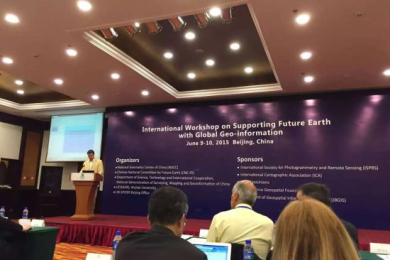The UN-SPIDER Beijing Office in cooperation with the National Geomatics Center of China (NGCC), the Chinese National Committee for Future Earth (CNC-FE), the UN Project Management Office (National Administration of Surveying, Mapping and Geoinformation - NASG) and LIESMARS - Wuhan University co-organized the "International Workshop on Supporting Future Earth with Global Geo-information" from 9 to 10 June, Beijing, China.
UN-SPIDER contributed to the session "Disaster Risk Reduction and Global Geo-information" to support sustainable development and Future Earth initiative with the effort of establishing reliable global geo-information. The session also aimed to promote integration of Earth observation and geo-information technologies in implementing the Sendai Framework for Disaster Risk Reduction: 2015-2030, which is the theme of upcoming UN-SPIDER Conference in Beijing to take place in September.
Future Earth is a global research platform aiming to provide knowledge and supporting to accelerate our transformations to a sustainable world. Dynamic Planet, Global Development and Transformations towards Sustainability are its three research themes. These depend critically on the availability and utilization of reliable information at both the local and the global scale.
With the advancement of remote sensing and spatial information technology, more and more spatial data sets at both global and local scales have been produced in the past and will be generated continuously in the future. Supporting Future Earth with reliable global geo-information is becoming a key challenge for assuring a successful global understanding, environmental change analysis, transformational development and dynamic modeling. The workshop aimed at promoting the multi-disciplinary collaboration towards providing reliable global geo-information to support Future Earth.
Approximately 60 experts and participants from world wide of UN entities, academia, institute, and corporate sector participated the workshop.

